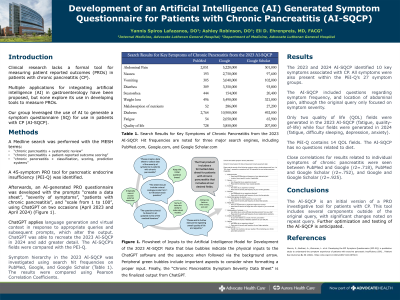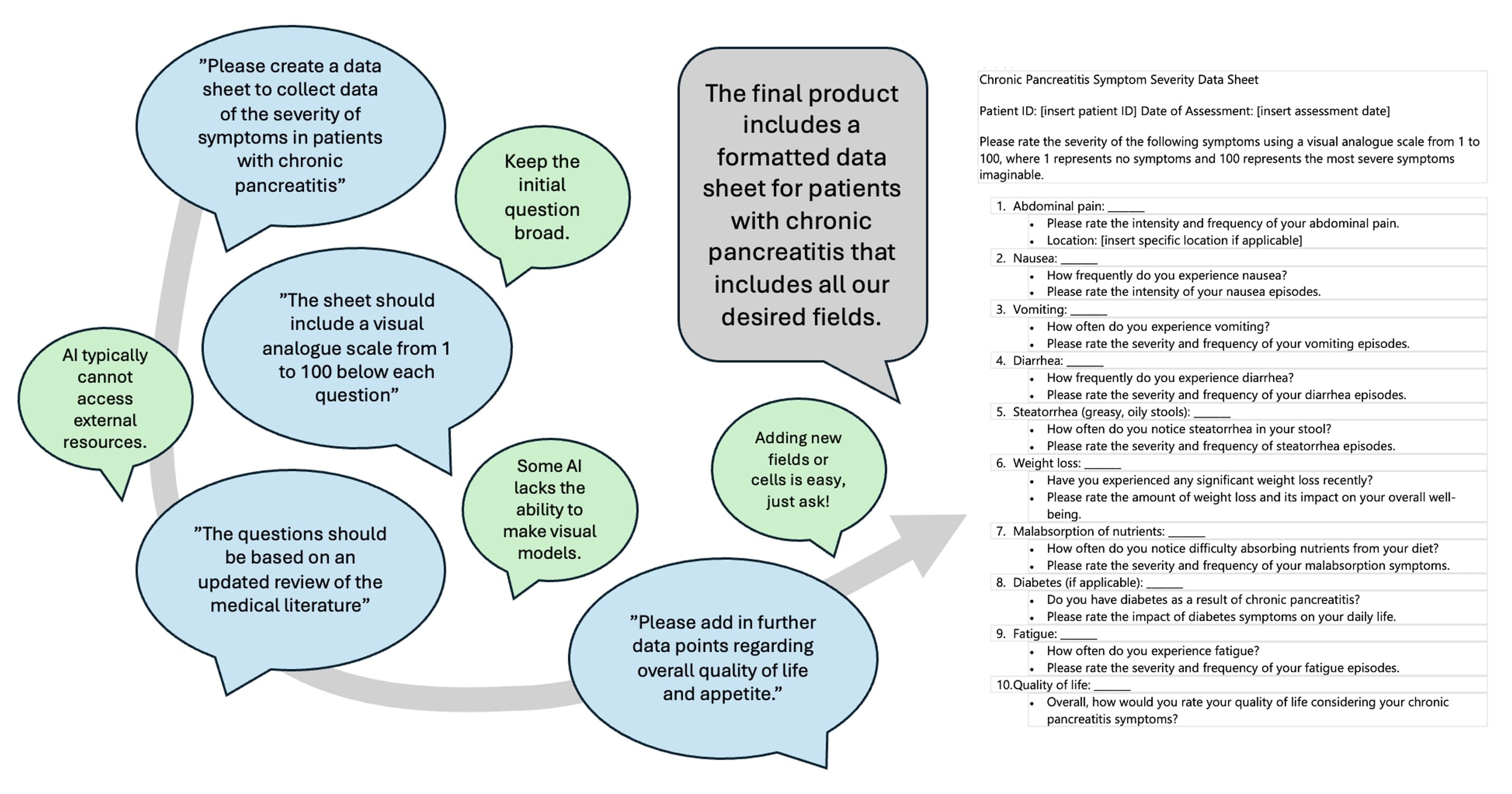Monday Poster Session
Category: Biliary/Pancreas
P1724 - Development of an Artificial Intelligence Generated Symptom Questionnaire for Patients With Chronic Pancreatitis (AI-SQCP)
Monday, October 28, 2024
10:30 AM - 4:00 PM ET
Location: Exhibit Hall E

Has Audio

Yannis Lafazanos, DO
Advocate Lutheran General
Park Ridge, IL
Presenting Author(s)
Yannis Lafazanos, DO1, Ashley Robinson, DO2, Eli D. Ehrenpreis, MD, FACG3
1Advocate Lutheran General, Park Ridge, IL; 2Advocate Lutheran General, Chicago, IL; 3E2Bio Consultants, Evanston, IL
Introduction: Clinical research lacks a formal tool for measuring patient reported outcomes (PROs) in patients with chronic pancreatitis (CP). Multiple applications for integrating artificial intelligence (AI) in gastroenterology have been proposed, but none explore its use in developing tools to measure PROs. Our group leveraged the use of AI to generate a symptom questionnaire (SQ) for use in patients with CP, the AI-SQCP.
Methods: A Medline search was performed with the MESH terms “chronic pancreatitis + systematic review”, “chronic pancreatitis + patient-reported outcome scoring”, and “chronic pancreatitis + classification, scoring, prediction systems”. A 45-symptom PRO tool for pancreatic endocrine insufficiency (PEI-Q) by Johnson et al was identified. Afterwards, an AI-generated PRO questionnaire was developed with the prompts “create a data sheet”, “severity of symptoms”, “patients with chronic pancreatitis”, and “scale from 1-100”, using ChatGPT on two occasions (April 2023 and April 2024) (Figure 1). ChatGPT applies language generation and virtual context in response to queries and subsequent prompts, which alter the output. ChatGPT was able to recreate the 2023 AI-SQCP in 2024 and add greater detail. The AI-SQCP’s fields were compared with the PEI-Q. Symptom hierarchy in the 2023 AI-SQCP was investigated using search hit frequencies on PubMed, Google, and Google Scholar (Table 1). The results were compared using Pearson Correlation Coefficients.
Results: The 2023 and 2024 AI-SQCP identified 10 key symptoms associated with CP. All symptoms were also present within the PEI-Q’s 27 symptom groups. The AI-SQCP included questions regarding symptom frequency, and location of abdominal pain, although the original query only focused on symptom severity. Only two quality of life (QOL) fields were generated in the 2023 AI-SQCP (fatigue, QOL) while four fields were generated in 2024 (fatigue, difficulty sleeping, depression, anxiety). The PEI-Q contains 14 QOL fields. The AI-SQCP has no questions related to diet. Close correlations for results related to individual symptoms of chronic pancreatitis were seen between PubMed and Google (r2=.718), PubMed and Google Scholar (r2=.752), and Google and Google Scholar (r2=.925).
Discussion: The AI-SQCP is an initial version of a PRO investigative tool for patients with CP. This tool includes several components outside of the original query, with significant changes noted on repeat query. Further optimization and testing of the AI-SQCP is anticipated.

Note: The table for this abstract can be viewed in the ePoster Gallery section of the ACG 2024 ePoster Site or in The American Journal of Gastroenterology's abstract supplement issue, both of which will be available starting October 27, 2024.
Disclosures:
Yannis Lafazanos, DO1, Ashley Robinson, DO2, Eli D. Ehrenpreis, MD, FACG3. P1724 - Development of an Artificial Intelligence Generated Symptom Questionnaire for Patients With Chronic Pancreatitis (AI-SQCP), ACG 2024 Annual Scientific Meeting Abstracts. Philadelphia, PA: American College of Gastroenterology.
1Advocate Lutheran General, Park Ridge, IL; 2Advocate Lutheran General, Chicago, IL; 3E2Bio Consultants, Evanston, IL
Introduction: Clinical research lacks a formal tool for measuring patient reported outcomes (PROs) in patients with chronic pancreatitis (CP). Multiple applications for integrating artificial intelligence (AI) in gastroenterology have been proposed, but none explore its use in developing tools to measure PROs. Our group leveraged the use of AI to generate a symptom questionnaire (SQ) for use in patients with CP, the AI-SQCP.
Methods: A Medline search was performed with the MESH terms “chronic pancreatitis + systematic review”, “chronic pancreatitis + patient-reported outcome scoring”, and “chronic pancreatitis + classification, scoring, prediction systems”. A 45-symptom PRO tool for pancreatic endocrine insufficiency (PEI-Q) by Johnson et al was identified. Afterwards, an AI-generated PRO questionnaire was developed with the prompts “create a data sheet”, “severity of symptoms”, “patients with chronic pancreatitis”, and “scale from 1-100”, using ChatGPT on two occasions (April 2023 and April 2024) (Figure 1). ChatGPT applies language generation and virtual context in response to queries and subsequent prompts, which alter the output. ChatGPT was able to recreate the 2023 AI-SQCP in 2024 and add greater detail. The AI-SQCP’s fields were compared with the PEI-Q. Symptom hierarchy in the 2023 AI-SQCP was investigated using search hit frequencies on PubMed, Google, and Google Scholar (Table 1). The results were compared using Pearson Correlation Coefficients.
Results: The 2023 and 2024 AI-SQCP identified 10 key symptoms associated with CP. All symptoms were also present within the PEI-Q’s 27 symptom groups. The AI-SQCP included questions regarding symptom frequency, and location of abdominal pain, although the original query only focused on symptom severity. Only two quality of life (QOL) fields were generated in the 2023 AI-SQCP (fatigue, QOL) while four fields were generated in 2024 (fatigue, difficulty sleeping, depression, anxiety). The PEI-Q contains 14 QOL fields. The AI-SQCP has no questions related to diet. Close correlations for results related to individual symptoms of chronic pancreatitis were seen between PubMed and Google (r2=.718), PubMed and Google Scholar (r2=.752), and Google and Google Scholar (r2=.925).
Discussion: The AI-SQCP is an initial version of a PRO investigative tool for patients with CP. This tool includes several components outside of the original query, with significant changes noted on repeat query. Further optimization and testing of the AI-SQCP is anticipated.

Figure: Table 1. Note that blue bubbles indicate the physical inputs to the ChatGPT software and the sequence when followed via the background arrow. Peripheral green bubbles include important aspects to consider when formatting a proper input. Finally, the “Chronic Pancreatitis Symptom Severity Data Sheet” is the finalized output from ChatGPT by OpenAI.
Note: The table for this abstract can be viewed in the ePoster Gallery section of the ACG 2024 ePoster Site or in The American Journal of Gastroenterology's abstract supplement issue, both of which will be available starting October 27, 2024.
Disclosures:
Yannis Lafazanos indicated no relevant financial relationships.
Ashley Robinson indicated no relevant financial relationships.
Eli Ehrenpreis: E2Bio Life Sciences – Intellectual Property/Patents, Owner/Ownership Interest, Stock-privately held company.
Yannis Lafazanos, DO1, Ashley Robinson, DO2, Eli D. Ehrenpreis, MD, FACG3. P1724 - Development of an Artificial Intelligence Generated Symptom Questionnaire for Patients With Chronic Pancreatitis (AI-SQCP), ACG 2024 Annual Scientific Meeting Abstracts. Philadelphia, PA: American College of Gastroenterology.
